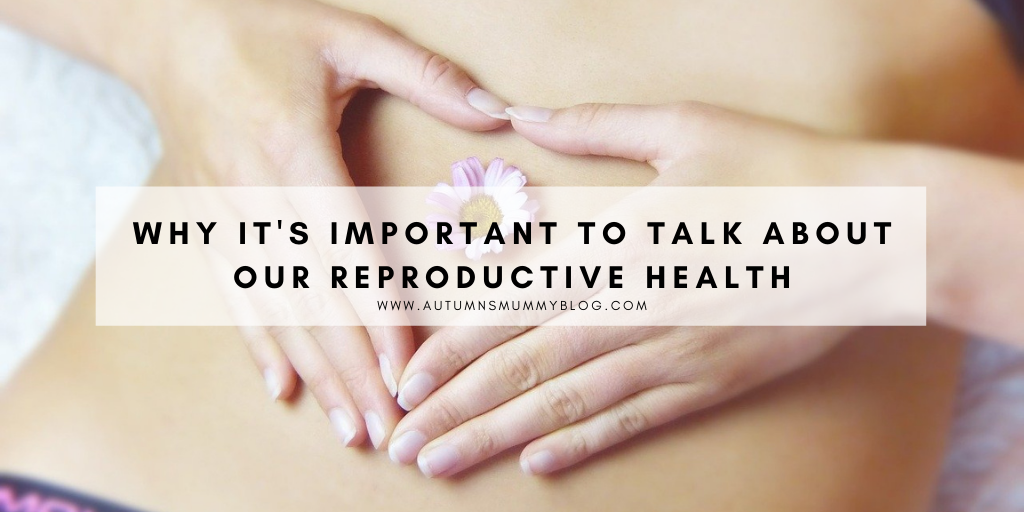Collaborative Post¦ It might seem like taboos are slowly breaking bit by bit, for better or for worse, but there are still a few things that the majority of us aren’t as willing to talk about publicly. A lot of people do not like to talk about anything related to their health. A greater proportion still doesn’t like to talk about sex or their reproductive organs. Combine both of those and you have our reproductive health, a topic that can scare many a person away. But here are a few examples of both how we should talk about it, and why we should talk about it.

There are essential checks we have to make
Reproductive health covers a wide variety of topics. While sex, sexual health, and pregnancy are all factors, so too are the other types of conditions that can affect our reproductive organs. There are a lot of health checks that women should get on a regular basis and some of them are going to be specific to both their reproductive organs and their secondary sexual characteristics. For instance, all women should know that they need to get breast exams and pap smears to test for both breast cancer and cervical cancer roughly once every three years. This way, their chances of catching such conditions earlier are greatly increased, which can also help us fight them more effectively.
It can make sure we know to get tested
One of the most common risks when it comes to our reproductive health is that of sexually transmitted illness. Any woman who has an active sex life is at risk of catching an STI. However, we often still associate these very widespread conditions with notions of immorality or some other kind of failing, when we all have a 60-90% of being affected after just one encounter with a member of the opposite sex. Websites like http://www.tarrantcounty.com/en/public-health/clinical-services0/adult-health-services.html are playing a key role in helping to educate women and men alike on STIs. However, it’s important to talk about those risks when it comes to educating others on reproductive health, too.
It can help us stay safe
Of course, while being aware of the risks is important so that we know to always check and make sure that we are healthy, some focus should go towards prevention, as well. There are some that think abstinence is the single best form of prevention but, without picking a side on what is the “better” choice, the stats show that young people, especially, are much less likely to end up accidentally pregnant or catching an STI if they are taught proper safe sex precautions, instead. Sites like https://www.plannedparenthood.org/learn/stds-hiv-safer-sex/safer-sex are great resources on all forms of sexual protection. If you’re having “the talk” with younger members of the family, it’s important to cover this topic, as well.

It can help us cope with loss
Reproductive health can also extend to the health questions and problems that can arise during pregnancy. Many of these can be some of the hardest for women to deal with, with miscarriage being a subject that many women will not broach, even to the extent of not telling anyone but their partner. Grief is a private experience and no-one should be pressured to share it if they do not want to. However, talking about it can help to normalize an experience that a lot of women feel alone in dealing with when, in reality, many more have faced it than they might ever realize, otherwise.
It needs to be taken more seriously
There is a growing problem in the medical world that has only started to be addressed. There are various studies showing that, in general, women’s pain often isn’t taken as seriously. This isn’t just by men in our lives, it’s by other women, and even by health professionals. This is because conditions often tied to pain in women’s reproductive health is often tied to conditions such as endometriosis, which can be hard to find and diagnose. However, as https://www.healthline.com/health/endometriosis/latest-endo-research shows, testing and education around these conditions, and the pain that often goes unaddressed in women, is improving. We can play an active role in that improvement by making sure that we’re talking about the pain we feel and how we’re treated when we feel it.
It can help us avoid unnecessary health products
There has always been a culture of selling products that simply aren’t necessary within the general health and wellness industry. Snake oil salesmen have existed since the dawn of time in one way or another. Even though their intentions may not always be as duplicitous, there are those who are currently taking part in releasing a wave of products that are unnecessary at best and, at worst, can actually give more complications in our reproductive health. The report from the Office of Women’s Health at https://www.womenshealth.gov/a-z-topics/douching sheds light on how it might not be recommended to use any of these vaginal cleanliness products.

Normalizing the conversation
Aside from the very practical and real benefits of talking about our sexual health, our reproductive organs, and our experiences of pregnancy and miscarriage, there is a wider social change that we can help along by talking about these topics. By normalizing the conversation, we can help women be a lot more aware of their own body, as well as educating ourselves about conditions and risks that we might have never known before. It may be hard for some women to “break the taboo,” but as long as more of us are doing so, we can make sure that attention is being paid to conditions and experiences that affect a lot of us.
There’s no point trying to ignore what could potentially cause us harm. Make sure that you take the time to talk about reproductive health concerns when they arise, be it with your daughters, mother, sisters, friends, daughters-in-law, and otherwise.
Disclosure: This is a collaborative post.
